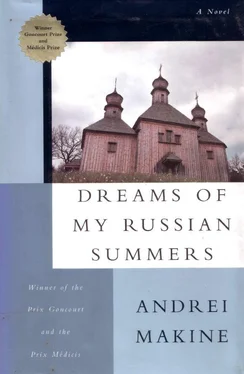And yet on entering that empty bookshop in the middle of a heat-stunned provincial town, and on finding my latest book on the shelf, I had just that impression. "Three years went by." The cemetery, the family vault of the Belvals and the Castelots. And now this book in the colorful mosaic of jackets under the sign "New French Novels"…
Toward evening I reached the forest of the Landes. I wanted to walk, for two days or perhaps more, sensing that beyond this rolling country covered in pine trees the ocean lay perpetually in wait. Two days, two nights… Thanks to the Notes, time had acquired an extraordinary density for me. Despite living in Charlotte's past, it seemed to me that I had never experienced the present so intensely! Those landscapes of days gone by threw into a singular relief this patch of sky between the clusters of pine needles; this glade lit by the setting sun like a river of amber…
In the morning, back on the road (a gashed pine trunk, which I had not noticed the previous evening, was weeping its resin – what the local people called its gemmé ), I remembered, for no special reason, those shelves at the back of the bookshop, "Eastern European Literature." My first books were there, sandwiched, and at the risk of inspiring giddy megalomania in me, between those of Lermontov and Nabokov. All this was the fruit of a pure and simple literary hoax on my part. For the novels had been written directly in French and rejected by publishers. I was "some funny little Russian who thought he could write in French." In a gesture of despair I had then invented a translator and submitted the manuscript, presenting it as translated from the Russian. It had been accepted, published, and hailed for the quality of the translation. I told myself, at first bitterly, later with a smile, that my Franco-Russian curse was still upon me. But whereas in childhood I had been obliged to conceal my French graft, now it was my Russianness that failed to find favor.
That evening, settled down for the night, I reread the latest pages of my Notes. In the fragment jotted down the previous evening I had written,
A boy of two has died in the big izba facing the apartment block where Charlotte lives. I see the child's father propping up against the handrail on the front steps an oblong box draped with red cloth – a little coffin. Its doll-like dimensions terrify me. I need immediately to find a place under heaven, or on earth, where one could imagine this child still alive. The death of a human being younger than oneself calls the whole universe into question. I rush to Charlotte. She perceives my anguish and says something to me that is astonishing in its simplicity: "Do you remember how we saw a flight of migrating birds in the autumn? They flew over the courtyard, yes, and then they disappeared. That was that, but somewhere in distant lands they are still flying. It is only because our eyesight is too weak that we can't see them. It's the same with people who die…"
As I slept, I thought I could hear the branches making a sound that was more powerful and continuous than usual. As if the wind had not ceased blowing for a single moment. In the morning I discovered that it was the sound of the ocean. In my weariness the previous evening I had stopped, without knowing it, on the frontier where the forest began to merge into the wave-lashed dunes.
I spent the whole morning on that deserted shore, watching the imperceptible rising of the waters… When the tide began to ebb, I resumed my journey. Barefoot on the wet sand I would go down toward the south now. Walking along, I thought about that little bag that from the time of our childhood my sister and I had called "the Pont-Neuf bag" and which contained the little pebbles wrapped in scraps of paper. There was a "Fecamp," a " Verdun," and also a " Biarritz," a name we associated with quartz and not with the town, which was unknown to us… I was going to walk beside the ocean for ten or twelve days and find that town, of which a tiny fragment was lost somewhere in the depths of the Russian steppes.
It was in September, through the intermediary of a certain Alex Bond, that the first news from Saranza reached me…
This "Mr. Bond" was in fact a Russian businessman, a very characteristic representative of the generation of "new Russians" who at that time were beginning to make their presence felt in all the capitals of the West. They butchered their names, American style, thus often identifying themselves without realizing it either with the heroes of spy novels or with extraterrestrial beings from the science fiction stories of the fifties. At the time of our first meeting I had advised Alex Bond, alias Alexei Bondarchenko (meaning "Cooper"), to gallicize his name and present himself as "Alexis Tonnelier," rather than mutilate it as he had done. Without a ghost of a smile, he explained to me the advantages of a short and euphonious name in business… I had the impression I was understanding less and less of the Russia that I now saw via these "Bonds," these "Kondrats," and these "Feds."…
He was going to Moscow and, touched by the sentimental aspect of my commission, had agreed to make a detour. Going to Saranza, walking in its streets, meeting Charlotte, now seemed a good deal more strange to me than traveling to another planet. Alex Bond had been there "between two trains," as he put it. And, without an inkling of what Charlotte meant to me, he spoke on the telephone as if this were an exchange of news after the holidays: "No, but what a black hole that Saranza is! Thanks to you, I've discovered darkest Russia, ha ha. All those streets that lead straight out onto the steppe! And the steppe with no end to it… She's very well, your grandmother, don't you worry. Yes, she's still very active. When I arrived she wasn't there. Her neighbor told me she was at a meeting. The tenants in her apartment block have created a support group, or whatever, to save an old izba in the courtyard that they want to demolish. A huge building, two centuries old. So your grandmother… No, I didn't see her; I was between two trains. I had to be in Moscow that evening come hell or high water. But I left a message… You could go and see her. They let everyone in these days. They say the iron curtain's nothing more than a sieve now ha ha ha…"
All I had were my refugee papers, plus a travel document that authorized me to visit "all countries except the USSR." The day after my conversation with the "new Russian" I went to the Préfecture de Police to obtain information about the formalities for naturalization. In my mind I was trying to silence the thought that kept creeping back: "What you are embarking on now is an invisible race against the clock. Charlotte is at an age where every year, every month, could be her last."
For that reason I did not want to write or telephone. I had a superstitious fear of compromising my project with a few banal words. I needed to obtain a French passport quickly, go to Saranza, spend several evenings talking with Charlotte, and bring her to Paris. I saw all these actions being accomplished simply, in a flash, as in a dream. Then abruptly this image became blurred, and I found myself once more caught in the glutinous lava that clogged my movements – time.
The dossier I was required to assemble reassured me: no documents impossible to find, no bureaucratic snares. Only my visit to the doctor left me with a painful impression. Yet the examination lasted a mere five minutes and was, when all's said and done, quite superficial: my state of health turned out to be compatible with French nationality. Having listened to my chest, the doctor told me to bend over, keeping my legs quite straight, and touch the ground with my fingers. I complied. It must have been my excessive alacrity that made him uneasy. The doctor seemed embarrassed and stammered, "Thank you, that's fine," as if he were afraid that in my zeal I might bend over again. Often some trifle in our attitudes is enough to alter the meaning of the most ordinary situations: two men in a small consulting room in a glaring white light; suddenly one of them bends, touches the ground almost at the feet of the other, and remains thus for a moment, awaiting, it seems, the second man's approval.
Читать дальше












